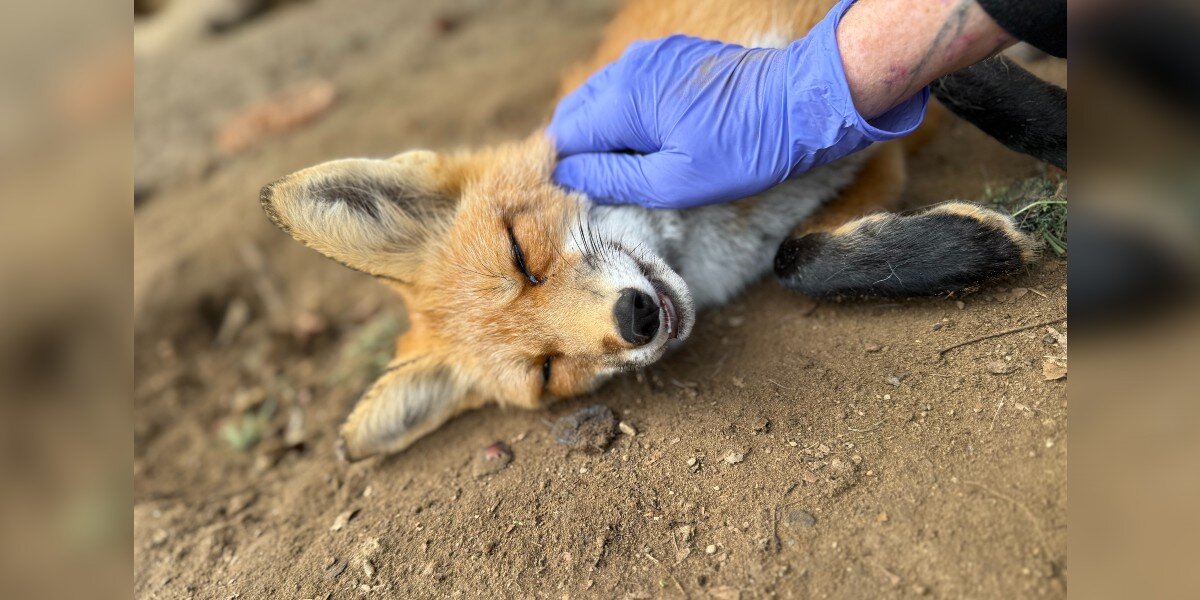On the outside, Boots looks like an ordinary fox: bright copper fur, curious brown eyes and a fluffy tail that bounces when he runs.
But inside, Boots is built a little differently.
 Newhouse Wildlife Rescue
Newhouse Wildlife Rescue
Instead of hunting, Boots wants belly rubs. He prefers the company of Newhouse Wildlife Rescue staff to his fellow foxes. Digging, a crucial survival skill for foxes, who live in dens, is of no interest to Boots.
Basically, since his intake at Newhouse Wildlife Rescue, Boots has proven time and again that he is simply too friendly to release back into the wild.
In March, a Reading, Massachusetts, animal control officer found Boots curled up in a soggy little ball, shivering in the cold rain. He brought the then 6-week-old kit to the rescue, where Jane Newhouse put Boots into an incubator.
 Newhouse Wildlife Rescue
Newhouse Wildlife Rescue
“He used to do a lot of crying and whining for his mom,” Newhouse told The Dodo. She also noticed the orphaned baby had trouble walking.
A vet exam showed an abscess on Boots’ head. They drained the abscess, treated several other minor ailments, and Boots rebounded.
“We figured he was good,” Newhouse said. “Maybe it was just the abscess causing an infection that made him feel off.”
 Newhouse Wildlife Rescue
Newhouse Wildlife Rescue
Boots joined four other fox kits in an enclosure for socializing. At first, he had a ball. But over time, he distanced himself.
“He was constantly trying to interact with us,” Newhouse said. “But when we move them to outdoor enclosures, we really minimize contact because we don’t want them getting used to people.”
 Newhouse Wildlife Rescue
Newhouse Wildlife Rescue
Then she saw Boots’ jaw sagging. This time, a CT scan showed neurological damage.
It’s likely Boots suffered from hydrocephalus, or fluid in his brain, as a kit. Parts of his brain didn’t form correctly, including the area responsible for scent, meaning he would not make an effective hunter.
The diagnosis explained Boots’ strange behavior. It also meant he could never be released into the wild.
 Newhouse Wildlife Rescue
Newhouse Wildlife Rescue
As devastating as this was, Newhouse knew Boots’ story wasn’t over. As soon as his fellow foxes were released, she gave her team the go-ahead to engage with Boots.
“He’s in the enclosure by himself,” she said. “He’s fully vaccinated. We know he can’t be released, so he’s just lonely.”
The team jumped at the chance to show Boots some love. In a Facebook post, Newhouse Wildlife Rescue said that of the 80 foxes they’ve cared for over the years, Boots was the first they’ve been unable to release. The organization also advised against playing with wild foxes, pointing out that “Boots is an unusual case.”
 Newhouse Wildlife Rescue
Newhouse Wildlife Rescue
Since his diagnosis a few weeks ago, Boots has embraced this new attention.
He races around his enclosure with excitement when staff walk up. Rolling onto his back, he begs for belly rubs. Newhouse points out that Boots has a good quality of life; he simply cannot live on his own in the wild.
As fall creeps in, Newhouse anticipates more foxes in need of rescuing, which means Boots will have to move somewhere else. Newhouse is currently waiting on approval from the Massachusetts Division of Fisheries and Wildlife while scoping out sanctuaries where Boots can live his best life.
At the time of publication, Newhouse wasn’t sure where Boots would end up.
The only thing she could count on: “I’m gonna miss him.”
If you’d like to support Newhouse Wildlife Rescue, you can donate to their efforts via their website.  Boat Guide Comes Across Crocodile Playing With A Delicate ‘Toy’ In The River“If that’s not object play, I don’t know what is.”
Boat Guide Comes Across Crocodile Playing With A Delicate ‘Toy’ In The River“If that’s not object play, I don’t know what is.”

